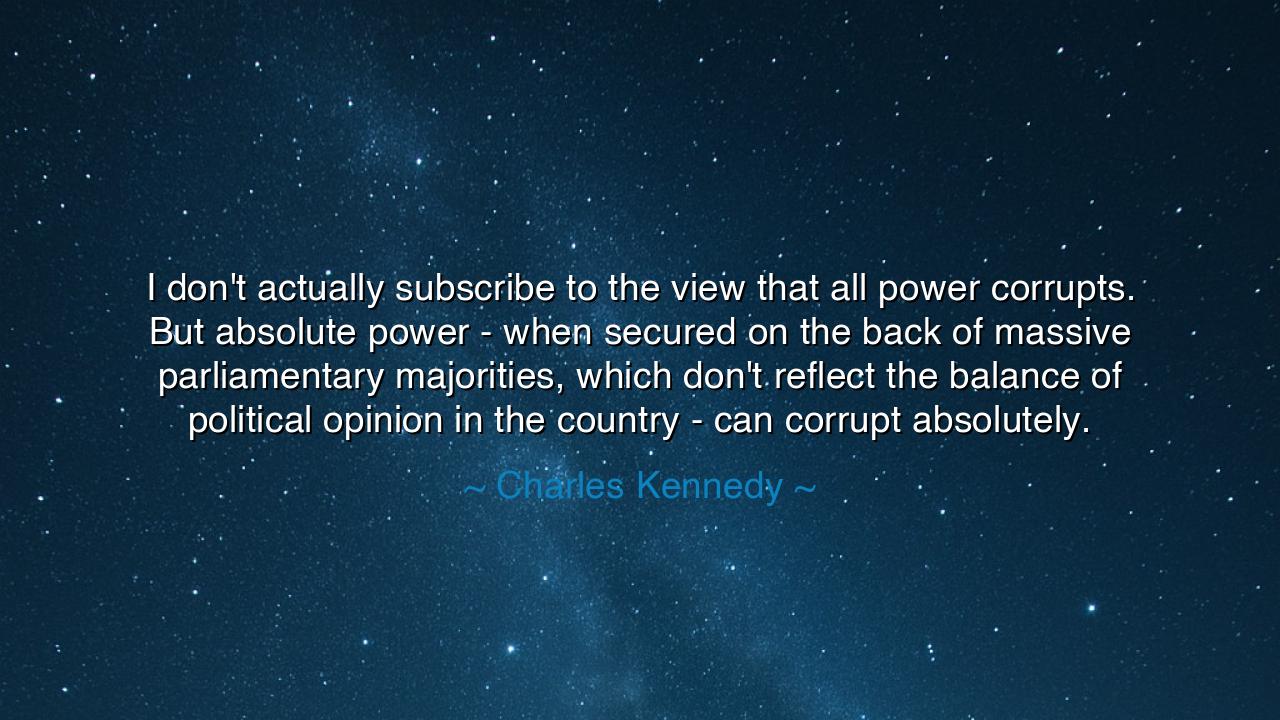
I don't actually subscribe to the view that all power corrupts.
I don't actually subscribe to the view that all power corrupts. But absolute power - when secured on the back of massive parliamentary majorities, which don't reflect the balance of political opinion in the country - can corrupt absolutely.






Hearken, children of the ages, to the discerning words of Charles Kennedy, who declared: “I don't actually subscribe to the view that all power corrupts. But absolute power—when secured on the back of massive parliamentary majorities, which don't reflect the balance of political opinion in the country—can corrupt absolutely.” In this utterance lies the eternal truth of authority, vigilance, and the peril of unchecked dominion. Power in itself may serve virtue and order, yet when concentrated without restraint, it threatens to erode justice, truth, and the welfare of the people.
Kennedy teaches that balance and accountability are the guardians of virtue. A ruler or assembly may wield great authority without succumbing to corruption, but when the will of the few overwhelms the voice of the many, the structures of governance become susceptible to moral decay. The illusion of absolute support, though built upon superficial or numerical majorities, cannot substitute for the equilibrium of conscience, reason, and representation.
Consider the tale of King Louis XIV of France, whose unchallenged authority, though tempered by skill and ceremony, gradually centralized power to such an extent that the voices of the populace were silenced. Absolutism, secured upon the absence of effective counsel or balance, led not only to extravagant excess but to the eventual upheaval of revolution. Kennedy’s reflection resonates here: absolute power unchecked by true balance can corrupt absolutely, no matter the outward appearance of strength or legitimacy.
The ancients themselves recognized this principle. Aristotle, Cicero, and the sages of Rome taught that governance must be tempered by law, reason, and the diversity of voices. Even the most virtuous ruler risks moral peril if insulated from counsel and accountability. Kennedy’s words echo this timeless understanding: power becomes dangerous when it is unbalanced, unchallenged, and concentrated, removing the natural checks that preserve justice and moderation.
Thus, his counsel is both warning and guidance: cherish the equilibrium of opinion, the tempering of authority, and the scrutiny of governance, for only through such vigilance can the blessings of power be preserved from corruption. Absolute dominion, when erected on fragile foundations or numerical dominance alone, imperils the very society it claims to serve.
Carry this teaching, children of generations yet unborn: wield authority with restraint, respect, and humility, and ensure that the structures of governance reflect the full spectrum of conscience and voice. In doing so, power may serve as a tool of justice, not a weapon of corruption, and the balance of society may endure through the ages.






YTDinh Ngoc Yen Trang
This quote feels especially relevant today. It highlights how democracy can paradoxically create undemocratic outcomes when electoral systems don’t mirror public sentiment. It makes me question whether our political institutions are flexible enough to evolve. Should we be rethinking how representation works, so that power truly aligns with diversity of opinion rather than being monopolized by one dominant group?
AAsuna
It’s interesting how Kennedy separates ‘power’ from ‘absolute power.’ That distinction feels crucial. Maybe power, when shared and transparent, can actually be a force for good. But when majorities become too large, they stop listening. Isn’t that what we see in modern politics — leaders mistaking dominance for legitimacy? I wonder if voters realize how easily democracy can slip into complacency.
THLuong Thi Huong
This quote makes me think about how fragile democracy can be. When one party dominates, even through legitimate elections, it can start reshaping laws and norms to secure its own permanence. At what point does majority rule turn into soft authoritarianism? I like how Kennedy captures that thin line between leadership and tyranny — it’s not power that’s the problem, it’s imbalance.
DNDung Nguyen
I find this quote refreshingly balanced compared to the usual cynicism about power. Kennedy seems to believe that power itself isn’t evil, but that it becomes dangerous when detached from accountability. It makes me wonder — do modern democracies have enough checks to prevent this kind of corruption? With strong-party politics and media polarization, is genuine representation even possible anymore?
DBDuy Bui
This statement strikes me as a nuanced take on power and democracy. It’s not condemning authority itself, but warning against the imbalance that comes from misrepresentation. When political majorities don’t truly reflect public opinion, the system feels distorted. Do you think proportional representation could solve this problem, or is corruption an inevitable risk once any group gains overwhelming influence?